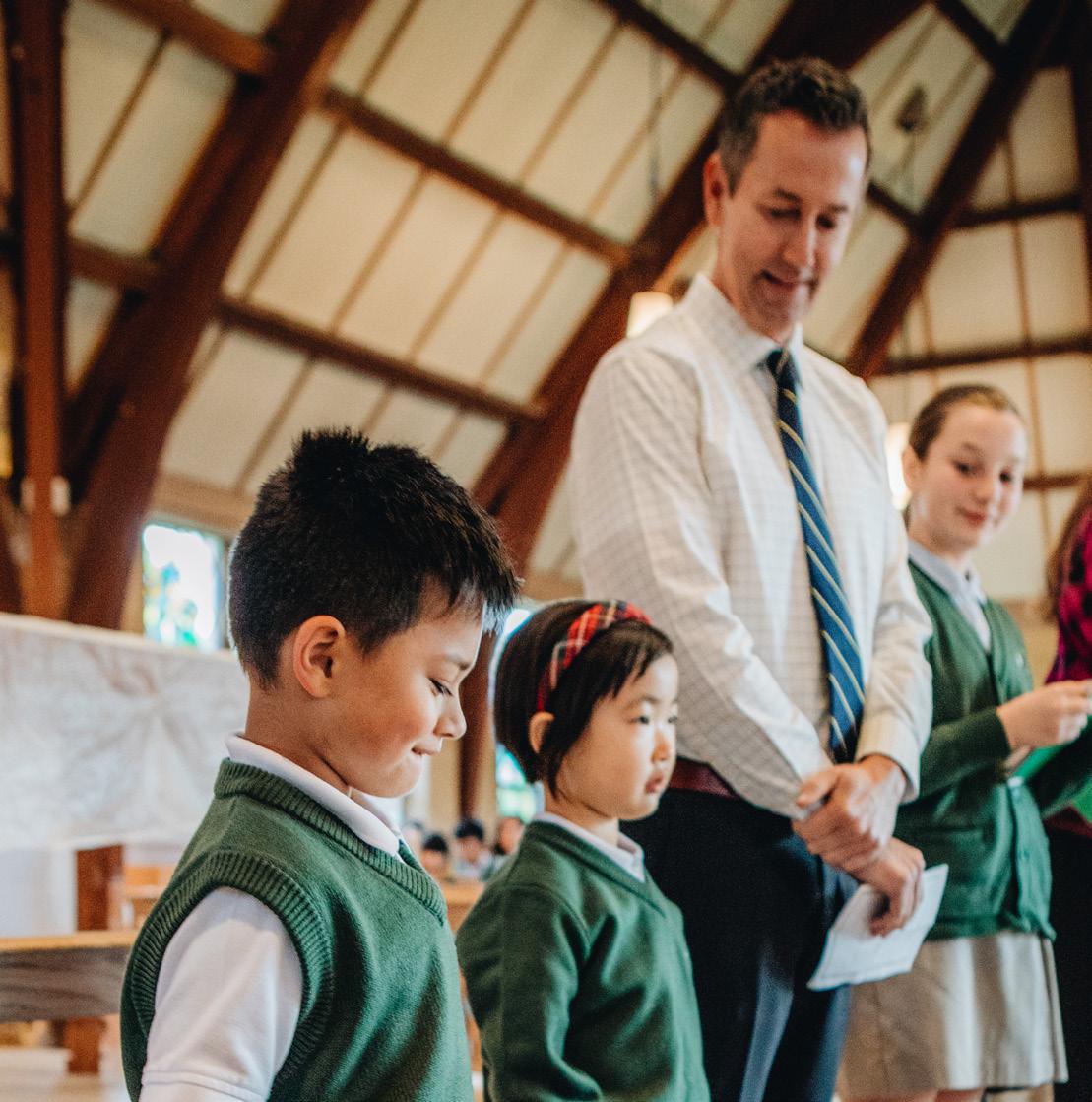
4 minute read
Spirituality in Schools
The Link Between Spirituality, Health, & Academic Success
BY DR. KIRK WHEELER, Head of School
Being in touch with our own values and having a sense of purpose that guides our life is what some define as spirituality. For some, spirituality relates to religious practices and organizations, while for others spirituality is a deep connection with nature, a higher being – something bigger than one’s self. For many, spirituality serves as a guiding compass for decision-making. Therefore, nurturing an inner sense of self and a connection to a broader purpose is vital when encountering choices and challenges throughout life.
Children are innately spiritual beings, and nurturing their spirituality promotes healthy development on many levels. While St. Thomas School is a non-sectarian school, spirituality is an intrinsic part of daily school life and an essential element in our approach to educating the whole child, along with physical, cognitive, and social/ emotional development. We begin each day in Chapel – a community gathering that centers on spirituality, world religions, character and leadership. It is within this space that students are invited to reflect on their own spirituality, practice mindfulness, and become more attune to their inner voice.
To further my own understanding of developing spirituality, I recently read an insightful book called The Spiritual Child: The New Science of Parenting for Health and Lifelong Thriving by Lisa Miller. To my delight, it showed clear scientific connections between spirituality and health and academic success. Miller cogently combines scientific research with anecdotal evidence from her work as a clinical psychologist to demonstrate how beneficial spirituality is to a child’s physical and mental health. What a pleasure it was to read substantive evidence to support what I, as a school leader, have always believed.
positive markers for thriving, including an increased sense of meaning and purpose and higher levels of academic success. For example, her work shows that with a spiritual foundation, children are “40 percent less likely to use and abuse substances; 60 percent less likely to be depressed as teenagers; and 80 percent less likely to have dangerous or unprotected sex.”
At St. Thomas School, we believe children who develop a spiritual core also develop a strong sense of self, compassion, and purpose, rather than setting their sights on acquiring success and defining their self-worth through continual comparisons to others. Young people with strong core virtues tend to accept good fortune with gratitude and humility, rather than feeling a sense of entitlement. Building this spiritually-based foundation helps establish a strong moral compass that guides children throughout their lives, helping them make healthy decisions when facing everyday challenges and temptations.
This is particularly important in the teenage years, as young adults begin asserting their independence and parents become less involved with their children’s social lives. As the weight of handling moral dilemmas and dealing with peer pressure increases, having a strong spiritual core becomes critical.
Parents can play a significant role in helping their child explore spirituality and provide touchstones along the way. Here are some tips to help children develop a positive spiritual relationship:
• Natural spirituality, or an “inner moral compass,” is part of our biological makeup and is associated with life success and satisfaction. As parents, it may be helpful to recognize that the emergence of spiritual awakening in our adolescent children matches a window of spiritual exploration in ourselves. Like our children, we naturally enter into life phases when we contemplate the meaning of life and our purpose. Thus, spiritual parenting provides us with opportunities for our own reflection and growth as well. Sharing our own questions regarding that spiritual journey with our children can be very helpful.
• Trust yourself to help guide your children’s spiritual life. You do not need to have studied religion or be knowledgeable about specific faith practices. This is about spirituality – not religion. Be open to questions, listen deeply to your child’s questions, and explore together.
• Author Lisa Miller encourages her readers to use spiritual language daily, and to share our spiritual experiences, which is frequently about applying a spiritual lens to everyday experiences, and building a spiritual practice together. Children are naturally curious and connected to the world around them. Often, embedded in the typical “why” questions children ask are invitations to dig deeper. Seize moments that lend themselves to contemplation – a walk in the woods, an evening routine, a family blessing, or rituals at dinner or holidays. Invite children in to your own spiritual moments – prayers, sharing of gratitude, times of meditation and mindfulness.
• Tend the “field of love” and strive to live an inspired life. Help children feel connected to their families and understand their place within generations of relationships. Births, deaths, divorce – all of these are part of the ebb and flow of family life. This is the field of love – talk to your children, help them to see all the connections, and practice expressing gratitude, resilience, and faith.
• Above all else – make time. Create opportunity, space and time for spiritual conversation and activity – allow it to be spontaneous. Spend time outdoors – just “be” with nature.
I am so intrigued by Miller’s work! I know that helping children nurture their spiritual core can have a positive impact on their character development and better prepare them for the life choices, social pressures and moral dilemmas they will face.




